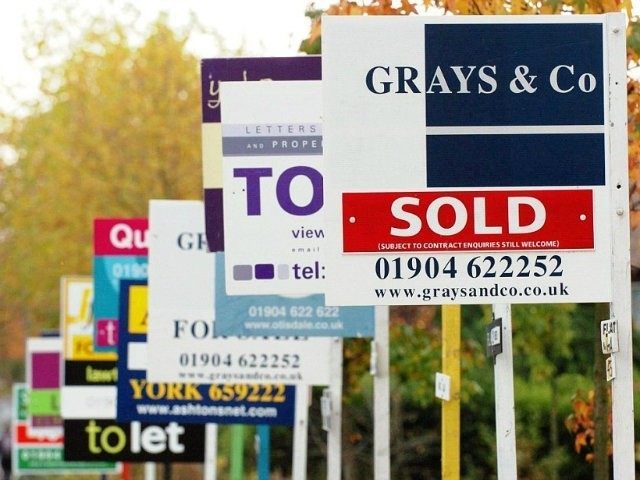House prices rose by almost 8 percent last year, the Halifax announced earlier today. Nationwide has the rises at 7.2 percent.
Both agree that the market has slowed in recent months, but the Halifax is still predicting rises of 3-5 percent in 2015. This view is endorsed by the Royal Institute of Chartered Surveyors, which is also predicting house price inflation of 3 percent this year.
London, meanwhile, saw house price inflation at more than double the rate of elsewhere else. Prices rose by around 16 percent in 2014.
Many, particularly if they own a house in London, might see this as ‘a good thing’, a sign of economic strength. I think it’s a sign of something else.
How house prices are rising at over seven times the rate of inflation
The official rate of inflation – known as CPI (the Consumer Price Index) currently stands at 1 percent. CPI is a measure of the prices of a selection of essential items. With the collapsing oil price, it is likely to fall further when December’s numbers come in.
So we have a situation in which house prices rising at several times the official rate of inflation. If you really want to manipulate statistics, you could argue seven times the rate of inflation – or even 16 times if you live in London.
When the Bank of England Monetary Policy Committee Bank of England meet to set rates, one of the main determinants of what their base rate should be is CPI. If it is low, as it is at the moment, interest rates can be kept low. If it is high, interest rates must be put up – effectively, pushing up the price of money to combat inflation.
I’m sure you’d agree that a roof over our heads – a house, in other words – is a fairly essential item. The only thing we spend more on through the course of our lives than a house is our government. The price of a house should be included in CPI.
But the result would be that CPI would be higher, a lot higher, and thus interest rates would have to rise. If money then cost more to borrow, people would borrow less – and so house prices would fall, probably back into line with earnings.
My view is that they badly need to do this. One extreme example is Camden. The average first-time buyer pays £614,315 for a house there. That is 11.4 times the gross (not even the net!) average annual earnings in the area. Three times earnings is supposed to be healthy!
But our glorious leaders do not want house prices to fall. It was, more than anything else, the crashing property market in 1989-94 – memories of which still linger – which made the Tories unelectable for half a generation. It’s why every government since has done everything it can to prop up house prices, even if it means completely destroying the home-owning prospects of anyone born after about 1985.
Our glorious leaders want house prices to rise, because then homeowners feel richer and thus more likely to vote for them.
And one way they can manipulate this is by using inflation measures that do not include house prices.
There are many other ways by which inflation is manipulated and by which house prices are protected, both of which we’ll come to another day. But they are both manifestations of the endemic institutional obfuscation, which now blights our country.
The rise of the Mansion Tax meme
An interesting situation is developing, however. House prices have got so extreme that it is actually becoming politically expedient to bring them down at the top end of the market – hence Osborne’s recent raise of stamp duty for properties over £1.5m and the surge in popularity of the Mansion Tax idea.
I was amused to hear Diane Abbot on Radio 4 the other day on the subject of the Mansion Tax. She actually started portraying a person in Hackney, who now owns a house worth over a million pounds, as a victim somehow, because they bought the houses when they were cheap and didn’t know they were going to go up.
Most people’s house – especially if they live in London – earns more than they do. In fact, at one stage last year, the average asking price for a London property – now just shy of £600,000 – was been rising at £4,405 per week, according to Rightmove figures. That’s an annualised rate of £230,000. Who do you know that takes home £230,000 after tax? Not many people, I’ll bet – certainly not the average Londoner.
But what does that house actually do? It just deteriorates. It costs money to maintain. It should fall in value.
Sure, building a new house is a productive endeavour, doing a house up is productive, but just sitting in a house and watching it rise in value without doing anything to it is just a symptom of an economy that is sick. I could have bought a house in Hackney in 1995, taken up a career as serial killer and painted the walls with the blood of my victims – it still would have risen in value.
I’m all for people getting rich on the back of their hard work, their inventiveness or their risk-taking. But many Londoners have got rich doing sweet FA.
A Mansion Tax is not the answer, for reasons I’ll explain another day. It does not address the other great obfuscation – that of land ownership in the UK. A land value tax, however, now that is something to think about.
Dominic Frisby is the author of Life After The State and Bitcoin: the Future of Money.

COMMENTS
Please let us know if you're having issues with commenting.